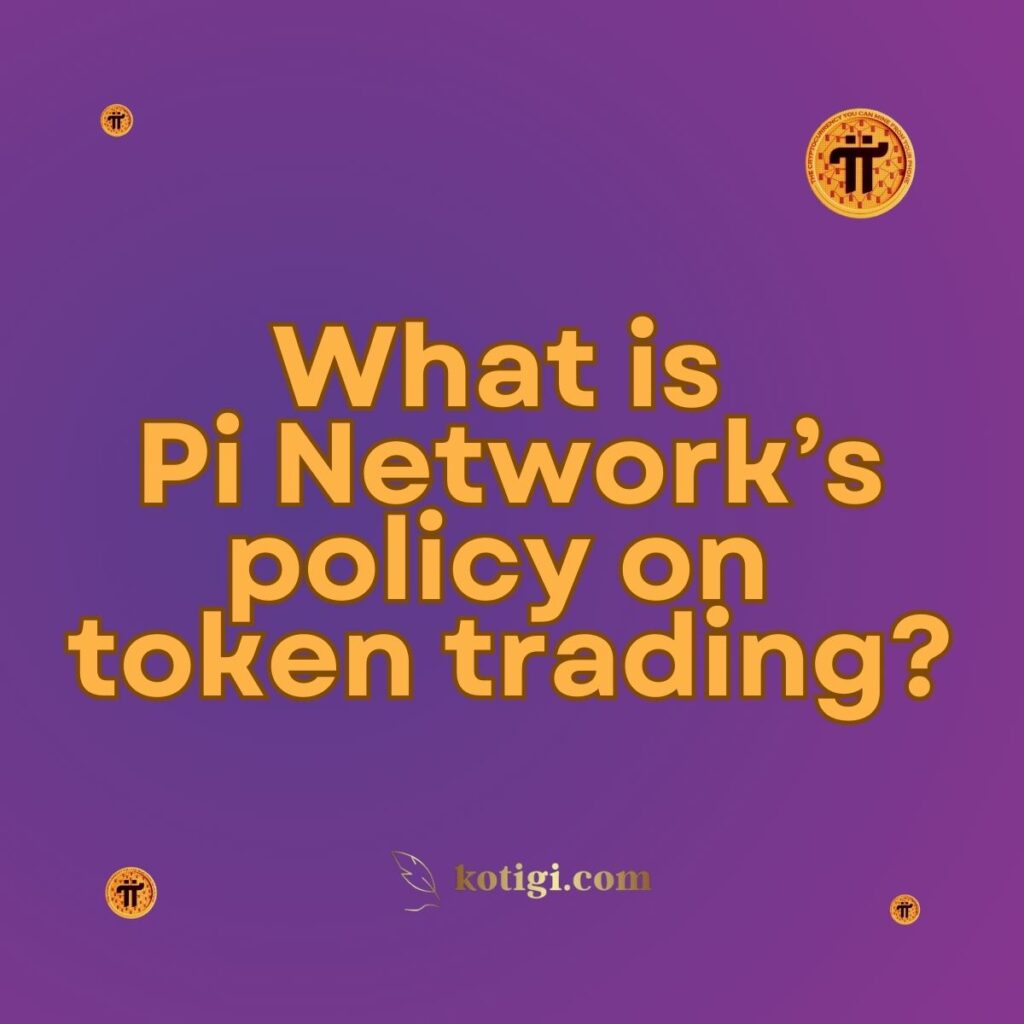
What is Pi Network’s policy on token trading?
Pi Network’s policy on token trading emphasizes user protection, ecosystem stability, and regulatory compliance. Currently, Pi tokens are not tradable on external exchanges until the network moves into the “open mainnet” phase. This policy ensures that users focus on building and securing the network rather than engaging in speculative trading.
Introduction
Pi Network has garnered widespread attention due to its unique approach to cryptocurrency mining and community-building. As with any digital asset, users are curious about the token trading opportunities that Pi Network might offer. However, Pi Network’s policy on token trading is carefully structured to align with its long-term vision, prioritizing sustainability, user protection, and compliance with regulatory frameworks. In this article, we will explore Pi Network’s current stance on token trading, the reasons behind the restrictions, and how this policy fits into the broader goals of the network.
1. Current Status of Pi Token Trading
1.1 Enclosed Mainnet Phase
Pi Network is currently in the “enclosed mainnet” phase, which means that Pi tokens are not yet tradable on external exchanges. This decision is intentional, designed to ensure that users focus on the integrity and development of the network rather than engaging in speculative trading. During this phase, Pi transactions are only possible within the Pi ecosystem.
1.2 Prevention of Premature Trading
Allowing token trading prematurely could expose Pi Network to market manipulation, speculation, and other risks that could undermine its stability. The enclosed mainnet helps to avoid these challenges by delaying trading until the network is fully matured and more secure.
1.3 Transition to Open Mainnet
Pi Network’s token trading policy will evolve once the project transitions to the “open mainnet” phase. This transition will allow external exchanges to list Pi tokens, providing users with the ability to trade freely. The timeline for this transition has not been set, as the team aims to ensure that the network is secure and capable of handling a large volume of transactions before allowing external trading.
2. Prioritizing Ecosystem Stability
2.1 Encouraging Network Growth
Pi Network’s policy on token trading is rooted in its goal of fostering ecosystem growth before opening up trading opportunities. By focusing on expanding its user base and strengthening the security of the network, Pi aims to create a solid foundation before allowing speculative trading to take place.
2.2 Avoiding Speculation
One of the key concerns Pi Network seeks to address with its current trading restrictions is the risk of market speculation. Speculative trading often leads to extreme price volatility, which could deter long-term users and harm the network’s reputation. By delaying trading, Pi ensures that the focus remains on building a sustainable ecosystem.
2.3 Strengthening Consensus Mechanisms
A stable and well-functioning consensus mechanism is crucial for the long-term success of Pi Network. The token trading policy helps prioritize the development of these mechanisms by encouraging users to participate in securing the network rather than focusing on short-term trading profits.
3. User Protection and Education
3.1 Preventing Scams and Fraud
Without a clear token trading policy, there is a higher risk of users falling victim to scams and fraud, particularly in the early stages of a cryptocurrency project. Pi Network’s cautious approach helps protect its users from these risks by preventing unauthorized exchanges and fraudulent schemes that could harm the community.
3.2 Educating Users About Responsible Trading
Another aspect of Pi Network’s token trading policy is its focus on user education. Before opening up trading, Pi aims to ensure that users are well-informed about the risks and responsibilities associated with trading digital assets. This approach is intended to foster a more responsible and knowledgeable user base, reducing the likelihood of impulsive or harmful trading behaviors.
3.3 Transparency and Communication
Pi Network maintains a transparent approach to its token trading policy, regularly updating its community about the network’s progress and the factors influencing the decision to delay trading. This level of communication ensures that users are kept informed and can make decisions based on accurate information.
4. Regulatory Considerations
4.1 Compliance with Local Laws
Pi Network is committed to adhering to local laws and regulations governing cryptocurrency trading. Many countries have strict rules regarding token trading, and by delaying trading until the network is fully prepared, Pi Network ensures that it operates within legal frameworks.
4.2 Avoiding Regulatory Scrutiny
By preventing premature trading, Pi Network reduces the likelihood of attracting regulatory scrutiny. Early trading on exchanges could expose the project to legal challenges, particularly in regions where cryptocurrencies are heavily regulated. Delaying token trading allows Pi to establish itself in a more stable and compliant manner.
4.3 Preparing for Global Compliance
As Pi Network prepares for the open mainnet phase, it is also working towards ensuring compliance with global regulatory standards. This preparation will help the network navigate the complex landscape of cryptocurrency regulations and provide a secure trading environment for users across the globe.
5. Future of Pi Token Trading
5.1 Open Mainnet and Exchange Listings
Once Pi Network transitions to the open mainnet phase, Pi tokens will become tradable on external exchanges. This will provide users with liquidity, allowing them to buy, sell, and trade their Pi tokens freely. The listing of Pi on major exchanges will mark a significant milestone in the project’s development and open up new opportunities for users and investors.
5.2 Trading Opportunities for Users
With the ability to trade Pi tokens, users will have more flexibility in managing their digital assets. This will also attract a broader range of participants, including traders and investors looking to capitalize on Pi’s market potential. However, users will need to exercise caution and conduct thorough research before engaging in any trading activities.
5.3 Ensuring Market Stability
As Pi Network opens up to token trading, it will continue to prioritize market stability. The team will implement measures to prevent extreme price fluctuations and ensure that the token’s value is reflective of the network’s true utility. These measures may include limits on token sales, trading fees, or other mechanisms designed to maintain a balanced and sustainable market.
Conclusion
Pi Network’s policy on token trading is a strategic decision aimed at protecting users, fostering ecosystem growth, and ensuring regulatory compliance. By delaying token trading until the network is fully mature and secure, Pi is prioritizing long-term stability over short-term gains. As the network progresses towards the open mainnet phase, users can look forward to new trading opportunities while remaining confident in the platform’s commitment to transparency and user protection.
Key Takeaways
- Enclosed Mainnet Phase: Pi Network’s tokens are not currently tradable on external exchanges, as the network focuses on growth and security.
- Ecosystem Stability: The trading policy prioritizes long-term network development over speculative trading.
- User Protection: By delaying trading, Pi Network reduces the risk of fraud and educates users on responsible trading.
- Regulatory Compliance: Pi Network ensures adherence to local and global regulations, preparing for future token trading.
- Future Trading Opportunities: Once the network transitions to the open mainnet, Pi tokens will become tradable, providing users with liquidity and new market opportunities.




